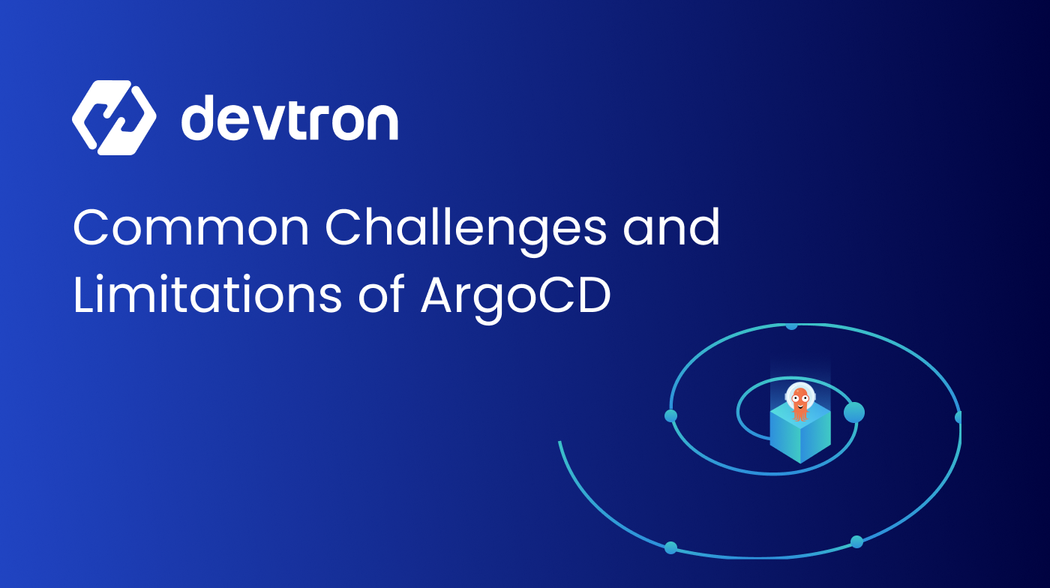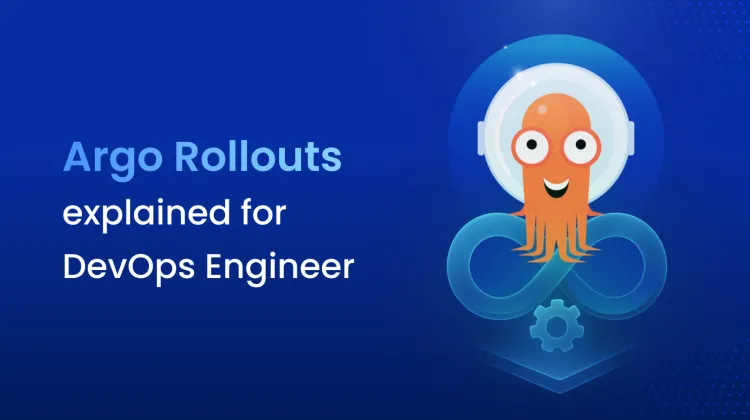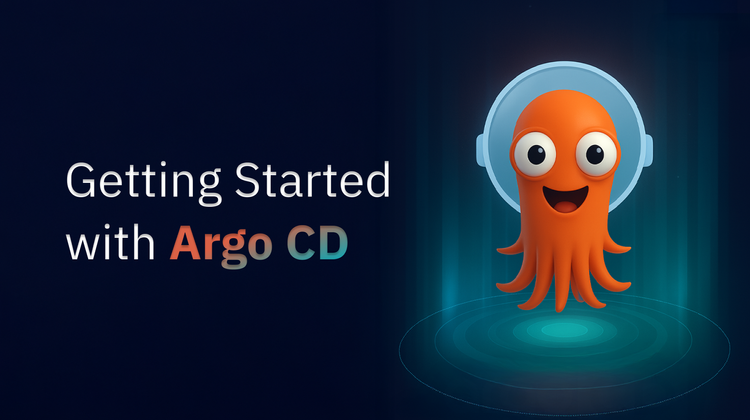1. ArgoCD is a GitOps tool that syncs the desired state of applications from Git repositories to Kubernetes clusters.
2. While powerful, ArgoCD alone is not a complete Continuous Deployment (CD) solution. It lacks features like security scanning, workflow flexibility, and automated rollbacks.
3. Teams face challenges in multi-cluster management, fragmented tooling, and high operational overhead when scaling ArgoCD.
4. Progressive delivery and compliance support are limited, requiring additional external tools like Flagger or CI scanners.
5. Devtron enhances ArgoCD by offering a unified platform with robust CI/CD workflows, built-in pre/post deployment checks, SLO-based rollbacks, auto-remediation, and simplified multi-cluster management.
Introduction
Robust ArgoCD is a Declarative GitOps tool that facilitates deployments to Kubernetes clusters. ArgoCD enables Developers and DevOps teams to deploy applications to the Kubernetes cluster effectively by leveraging the Git repositories as the single source of truth for the desired state of the application and its configurations.
ArgoCD operates on the core philosophy of GitOps, which uses Git as a single source of truth for deployments. The declarative approach allows developers to define their application's configuration in a version control system which makes collaboration and tracking configuration changes easy. Once the applications are deployed ArgoCD continuously monitors the state of applications running over Kubernetes clusters, if any changes are noticed on the source of truth ArgoCD syncs the desired state with the actual state.
Although ArgoCD is easy to use and has exceptional Git syncing capabilities, overhead operations still exist. As the Kubernetes start to scale, challenges to scale ArgoCD, reliability issues, and ideal implementation issues start to come up. While managing a single Kubernetes cluster is easy to handle, managing multiple Kubernetes clusters becomes cumbersome and the limitations of ArgoCD start to hinder the productivity of teams. To read about the overhead challenges that ArgoCD brings refer to this blog, where I have discussed ideal implementations and the operational challenges of ArgoCD.
In this blog, I will discuss some of ArgoCD's challenges and limitations and how they affect team productivity and efficiency. I will also explain how Devtron eliminates these challenges.
Argo CD, is it a single source of Truth for Continuous Deployments?
Before moving on to the limitations and challenges of ArgoCD, let’s address an important question: While ArgoCD is great at what it does, is it the one-stop solution for a continuous deployment tool?
Continuous Deployment (CD) is a term that generally refers to the set of best practices from DevOps that should be followed while deploying applications to servers. The best practices can be vulnerability scanning of images before deploying, approval-based deployments, robust RBAC, support for advanced deployment strategies, and flexibility in workflows i.e. Pre/Post deployment capabilities.
ArgoCD excels at maintaining the desired state of applications between Git repositories and Kubernetes clusters. Its core function is to continuously monitor Git repositories (as a single source of truth) and automatically sync changes to the target clusters, ensuring the deployed state always matches what's defined in Git.
Continuous Deployment (CD) must extend beyond the simple act of syncing Git repositories to Kubernetes clusters. It requires a whole ecosystem around it to facilitate proper CD to Kubernetes clusters alongside Argo CD. Some tools from this ecosystem facilitate vulnerability scanning, while others manage configuration, monitoring, and logging, ensuring that applications are not only deployed but also secure, reliable, and observable throughout their lifecycle.
Top Challenges with ArgoCD
Complexity in Multi-cluster Management
While managing multiple Kubernetes clusters, some common architectural implementations of ArgoCD are used to handle deployments over Kubernetes clusters. These implementations of ArgoCD come with multiple challenges and limitations that hinder the productivity of teams. In some of these implementations, each Kubernetes cluster needs its own ArgoCD instance, this fragmentation introduces challenges such as increased operational overhead, consistency issues across deployments, and difficulties in maintaining visibility and control. To understand these implementations and their pros and cons you can refer to the blog, where I have discussed what are the challenges and operational overhead.
Fragmented Progressive Delivery Support
In the fast-paced world of software development where teams are deploying new features and bug fixes multiple times a day, progressive delivery is something that has helped teams to maintain the stability of production servers. While ArgoCD provides the capability to sync Git repositories to Kubernetes clusters, it requires support from the ecosystem tools to manage advanced deployment strategies. You can’t rely on ArgoCD, you need to manage some external tools like Flagger to handle your advanced deployments. A new tool, which means new complexities and overhead work for teams. This brings me again to the same point i.e. ArgoCD is a Git syncing tool, it alone can’t facilitate proper Continuous Deployment to Kubernetes clusters.
No Native SLO-based Rollbacks or Health-based Auto-remediations
SLO-based rollbacks allow the teams to quickly revert to the previous stable versions when a deployment goes wrong, ensuring that service uptime remains within defined thresholds. Similar to this the health-based auto-remediation also automatically addresses common issues when any application faces a known issue. ArgoCD lacks native support for these SLO-based Rollbacks and Auto-remediations, to have these you need to maintain manually written scripts or need to manage external tools from the ecosystem.
Limited Security and Compliance Capabilities
As we have already discussed in the above sections, ArgoCD is a Git syncing tool that cannot facilitate proper continuous deployments, we need to manage multiple external tools. Similarly, when it comes to managing security and compliance ArgoCD does not have any capability to scan images for vulnerabilities before deployments. You need to handle the security scanning and compliance activities outside of the ArgoCD, like at the CI stage. ArgoCD simply syncs whatever it gets into its source of truth i.e. Git repository, without any considerations about possible vulnerabilities and compliance.
Limited Workflow Flexibility and CI/CD Integration
While deploying applications to Kubernetes clusters, the deployment phase alone is not always enough. Developers need to pass their applications through multiple stages to ensure the stability of the application in production environments. These stages can include pre/post CI operations and pre/post CD operations, where tasks such as code scanning, vulnerability assessments, and load testing can be executed. Moreover, developers often aim to promote applications across various environments, from development to testing and then to production. However, Argo CD does not provide the flexibility to execute these steps or facilitate the promotion of applications across environments. As a result, developers must rely on external CI tools or perform these tasks manually outside of Argo CD, which can hinder efficiency and complicate the deployment process.
High Operational Overhead Due to Tooling Fragmentation
In the above section, we have already discussed how alone ArgoCD cannot be the perfect solution for facilitating Continous Deployments to Kubernetes clusters, to make it a complete solution for Continous Deployments ArgoCD requires multiple external tools from the ecosystem. Even when you use external tools along with the ArgoCD, having a separate tool to execute separate actions increases the operational overhead. Teams need to manage multiple tools simultaneously along with their Kubernetes cluster and ArgoCD instance, which slows down the operational speed of teams and creates unnecessary complications. Moreover, these complicated systems often lead to some misconfigurations which can result in service disruptions.
How Devtron Addresses ArgoCD's Limitations
Devtron, an open-source platform, streamlines Kubernetes CI/CD operations while providing comprehensive application visibility on a single platform. In the above section, we have discussed how ArgoCD falls short as a Continuous Deployment tool for Kubernetes clusters. Devtron a platform which is powered by ArgoCD, leverages the strength of ArgoCD i.e. Git Syncing, and on top of that addresses the limitations and challenges of ArgoCD. Devtron as a unified platform helps users manage their CI/CD operations through a single interface i.e. no need to manage any external tools or any ArgoCD instance. Some of the capabilities that Devtron offers as a single dashboard to manage Kubernetes clusters and CI/CD operations are:
Capabilities to Manage Robust CI/CD Over Multiple Kubernetes Clusters
Devtron allows you to onboard multiple Kubernetes clusters over a single dashboard, from where you can easily manage CI/CD operations for all clusters. The need to manage a separate ArgoCD instance along with a CI tool is abstracted by Devtron. With Devtron developers do not have to worry about the configurations and management of ArgoCD instances, they can quickly configure their CI/CD workflows with all the flexibility.
Robust and Flexible CI/CD Workflows
Devtron’s CI/CD workflows are packed with multiple advanced features that offer flexibility and robust structure to CI/CD operations. Now with Devtron developers do not have to rely on external tools for executing pre/post-CI/CD operations, the tasks like static code scanning, vulnerability scanning of images, load testing, and many other such tasks can be executed using Devtron’s pre and post-CI/CD stages. Moreover, to make your CI/CD robust Devtorn offers features like Approval-based Deployments, a Deployment Window for controlled Deployments, support for advanced deployment strategies blue-green/canary deployments, and the capability for the promotion of the applications across environments.
SLO-Based Rollbacks and Auto-remediations
In the situation when deployment goes wrong or some minor issues require an immediate fix, teams need an automated approach to handle such situations. Devtron offers a feature by which teams can automatically remediate minor issues and perform SLO-based rollbacks when the current deployment is not meeting the threshold of service uptime.
Conclusion
To summarise the above discussion ArgoCD comes as a Git syncing tool, which syncs the desired state of applications/configurations from its source of truth i.e. Git repository to the current state at Kubernetes clusters. ArgoCD lacks multiple capabilities that are required for a robust CD tool, teams using only ArgoCD for Continuous Deployments have to rely on some external tools which increases the overhead work. Devtron a unified platform for managing your Kubernetes cluster and deployments over them, is powered by ArgoCD and it precisely addresses the limitations of ArgoCD with a wide range of advanced features. Some features of Devtron that help it to stand out are built-in flexible CI/CD workflows, application promotion capabilities, pre/post stages for CI/CD, SLO-based rollbacks, Auto-remediation capabilities, and robust RBAC controls.
FAQ
What is ArgoCD used for?
ArgoCD is a GitOps-based declarative tool that automates the synchronization of application states between Git repositories (single source of truth) and Kubernetes clusters.
What are the limitations of ArgoCD?
While ArgoCD is great for Git syncing, it lacks features like vulnerability scanning, advanced deployment strategies, workflow flexibility, and automated rollbacks. It also becomes complex in multi-cluster management.
How does Devtron enhance ArgoCD?
Devtron builds on top of ArgoCD, eliminating its limitations by offering a unified CI/CD platform with multi-cluster management, pre/post CI/CD workflows, approval-based deployments, SLO-based rollbacks, and auto-remediation.
Why can’t ArgoCD alone be considered a complete Continuous Deployment tool?
ArgoCD focuses only on Git-to-Kubernetes syncing. Continuous Deployment requires a broader ecosystem that includes vulnerability scanning, compliance checks, progressive delivery, and workflow automation which ArgoCD doesn’t natively provide.
How does FluxCD differ from ArgoCD?
FluxCD follows a Kubernetes-native, CLI-first approach with modular controllers, while ArgoCD provides a UI-driven experience. Both support GitOps, but FluxCD emphasizes lightweight, pull-based reconciliation, and ArgoCD emphasizes visibility with a rich UI.








